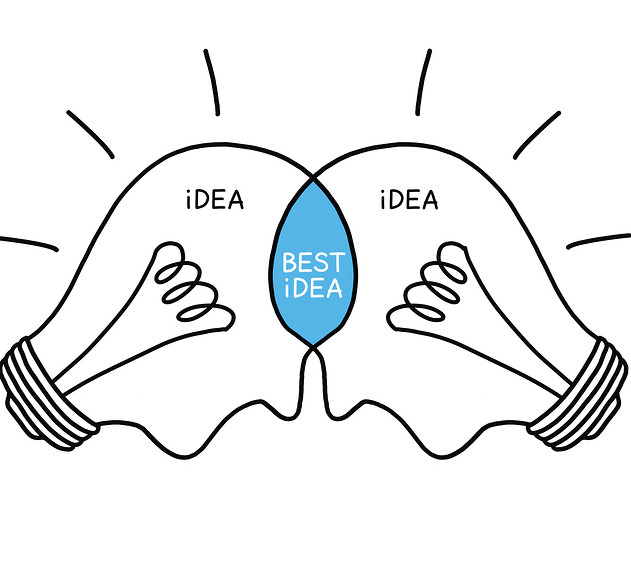
Best Idea light bulbs concept hand drawn with black marker on white. Teamwork makes the best ideas.
What is collaboration? In Let’s Stop Confusing Cooperation and Teamwork with Collaboration, I define collaboration as “two or more people working together to create something new in support of their shared vision.”
Collaboration is different from cooperation or coordination in that you collaborate around a shared vision, and something new is created as a result of your joint effort.
Is collaboration a problem-solving technique? . . . Yes. It can lead to break-through solutions.
Is collaboration a tool for innovation? . . . Yes. It can lead to creative ideas that lead to pivotal changes.
Is collaboration an attribute of organizational culture? . . . Yes. It can describe organizations where people effectively work across boundaries to produce spectacular results.
Collaboration is all of these – a technique, a tool, and an attribute – and you can find many articles and books telling you how to use collaboration for problem-solving, for innovation and creative, and how to embed it in an organization’s culture. But unfortunately, too often, the advice does not increase collaboration.
When done right, collaboration delivers powerful results. So why do so many efforts to increase collaboration fail?
Ken Blanchard, Jane Ripley, and Eunice Parisi-Carew say these efforts fail because people’s fundamental attitudes have not changed. They say that instead of thinking about how to get other people to collaborate more, the place to start is with yourself by creating a collaborative mindset.
Some people naturally have a collaborative mindset, but not everyone does.
According to research by Kenneth Thomas and Ralph Kilmann there are 5 basic styles or preferences for how we interact with others around solving problems and resolving conflict. Some people tend to gravitate toward competition, others are naturally collaborative.
Certain people use some modes better than others, whether because of temperament or practice, and therefore, tend to rely mostly on those modes. However, each of us is capable of using all five modes. And even if collaboration isn’t your natural style, you can become adept at collaborating if you decide it’s important to focus on.
What is your own mindset?
Most people agree that collaboration is essential in today’s diverse, globalized, and complex organizations. Although you might agree intellectually that collaboration is important, it might not be your natural style. Don’t assume you’re really collaborating just because you think it’s a good idea.
It is important to take a look at your own mindset and beliefs rather than approaching collaboration as simply a technique, process or tool to be implemented.
As I learned many years ago from a sad, frightened little boy named Benny, the best techniques will fail unless they are integrated with who you are and what you believe.
 This blog post was written in honor of the release of my friends Ken Blanchard, Jane Ripley, and Eunice Parisi-Carew’s excellent new book.
This blog post was written in honor of the release of my friends Ken Blanchard, Jane Ripley, and Eunice Parisi-Carew’s excellent new book.
Collaboration Begins With You teaches people at all levels – from new associates to top executives – that each of us needs to promote and preserve a winning culture of collaboration. Busting silos and bringing people together is an inside-out process that involves your character and intentions, your beliefs and attitudes, and your actions and behaviors. When we work to change our own erroneous beliefs regarding collaboration, silos are broken down, failures are turned into successes, and breakthrough results are achieved at every level.
Collaboration Begins with You strips down the fluff and gets to the essence of how any organization can create a collaborative mindset for the greater good.













Yes, totally agree that there is a big difference between cooperation and collaboration. Thinking about the 3C’s of partnership working can help define this difference in people’s minds: http://cuttingedgepartnerships.blogspot.co.uk/2013/06/the-3-cs-of-partnership-working-co.html
Thanks for your links, Charles. I’m especially interested in collaboration at a large group level and “stigmergic collaboration” is intriguing.
Excellent article Jesse. In my own experience, true collaboration is rare as hen’s teeth, and it’s often a word that is misused to actually mean “cooperation”. Here are my distinctions and take on it: http://www.aspire-cs.com/collaboration-its-not-what-you-think-it-is
Seems like we need to change our language frequently as buzzwords become meaningless. What’s frustrating is when the original concept is never fully understood before it becomes a buzzword. Thanks for sharing your own distinctions and continuum, Mary Jo.
The thing that interests me here is the idea of collaboration as action toward a shared vision. When a group all see the same thing bending their efforts to make it real, great things can happen. But isn’t there a step beyond this, where the group collaborates to create the vision itself? I think your graphic nicely suggests this. When the team collaborate on the vision itself, on that picture of the yet to be, something better emerges than any of them could have even imagined alone.
Absolutely, and well said. Thank you for emphasizing this important point.
Great insight. My thought here is as much as it is good to collaborate with people of shared vision, how easy can it be to find such people? From experience lately I’ve been trying to collaborate with some people on some great ideas but none seems quite interested in collaborating. People just want to venture on their own which is a good thing also but why not collaboration? I’m particularly interested in teamwork and collaboration. Thank you.
If you want to collaborate with someone who is not interested in collaborating, sometimes it is possible to help them see the higher purpose that serves both of you. But that can be difficult when collaboration is not their preferred approach. Wishing you the best!
It seems to me people collaborate when the shared vision seems better than their own was in the first place. If the shared vision is a compromise between your ideas and theirs, where you win some & lose some, then it may be better for them to stick with what they’ve got. The art of leading toward a shared vision for collaboration is to pull out the sparkly new ideas generated by mixing everyone’s ideas together. When you can do that, its likely everyone will see the value in collaborating.
Thanks for your thoughts, Julian.
Love this article. This quote sums it up and is something I will share with others.
“Collaboration is different from cooperation or coordination in that you collaborate around a shared vision, and something new is created as a result of your joint effort.”
I appreciate your thought provoking posts.
Thank you, Skip. So glad you found it helpful!
Thank you Ms Stoner. I found this article quite educative.
Dr. Yusuf Abdullahi, NAERLS, Ahmadu Bello University, Zaria, Nigeria
So glad to hear that. Thank you!
All three is very important for a organization but We can get best results with effective collaboration. Cooperation and Coordination the ways to achieve short terms goals but We need collaboration to achieve long terms goals and benefits to organization.
Interesting thoughts. Thanks for sharing them, Shiv.